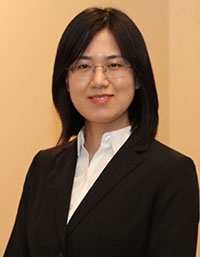
Dr. Ruihong Huang, assistant professor in the Department of Computer Science and Engineering at Texas A&M University, was selected to receive the National Science Foundation’s (NSF) Faculty Early Career Development (CAREER) Award — one of the most prestigious awards given to up-and-coming researchers. The grant provides funding to support promising integrated research and education.
Huang’s five-year CAREER project aims to create document-level event graphs that identify the relationships (e.g., temporal and causal relations) between events mentioned anywhere in a document in order to better contextualize real-world events and interpret how and why they happened, thus better supporting various event-oriented applications.
“Events tend to be described in a complex relationship with other events,” said Huang. “For example, a news article describing the events of a protest without information on why it was launched would be considered incomplete.”
It has been observed that the events described in various natural language texts (news articles, manuscripts, blogs, etc.) play a large role in forming a cohesive story and their presence is tightly related to the overall structure of a document and how it’s organized.
With the number of documents describing real-world events growing larger on a daily basis, document-level event graphs, which are models used to filter and structure information about the events described in text, are in high demand. However, building them requires identifying the relationship between the events even if they are sentences away, which causes multiple technical challenges. In addition, current event extraction methods rarely focus on how the events relate to each other and mainly focus on extracting isolated events with no context.
Huang’s research is focused on extracting events and understanding event-event relations from natural language text, which is the key to carrying out various analytical tasks such as predicting future events, detecting misinformation and other attempts to validate events, managing extreme events, answering complex questions and generating concise text summaries for analysis, and to help the government, companies and general public with improving situational awareness, reducing information overload and assisting with timely decision-making.
“During this research I will study correlations between events and the way in which an entire document is organized in order to overcome the fundamental difficulties in identifying event-event relations posed by the long distance between event mentions and the range of different words used to describe them,” said Huang.
The integration of research with education will also play a role in this CAREER project. In addition to supporting her current and future research, the funds will also go toward the teaching and training of future researchers in advanced information extraction views and methods, as well as to outreach efforts to expose high school and undergraduate students to computer science and natural language processing research.
Read more about Huang’s research and objectives in her NSF abstract.